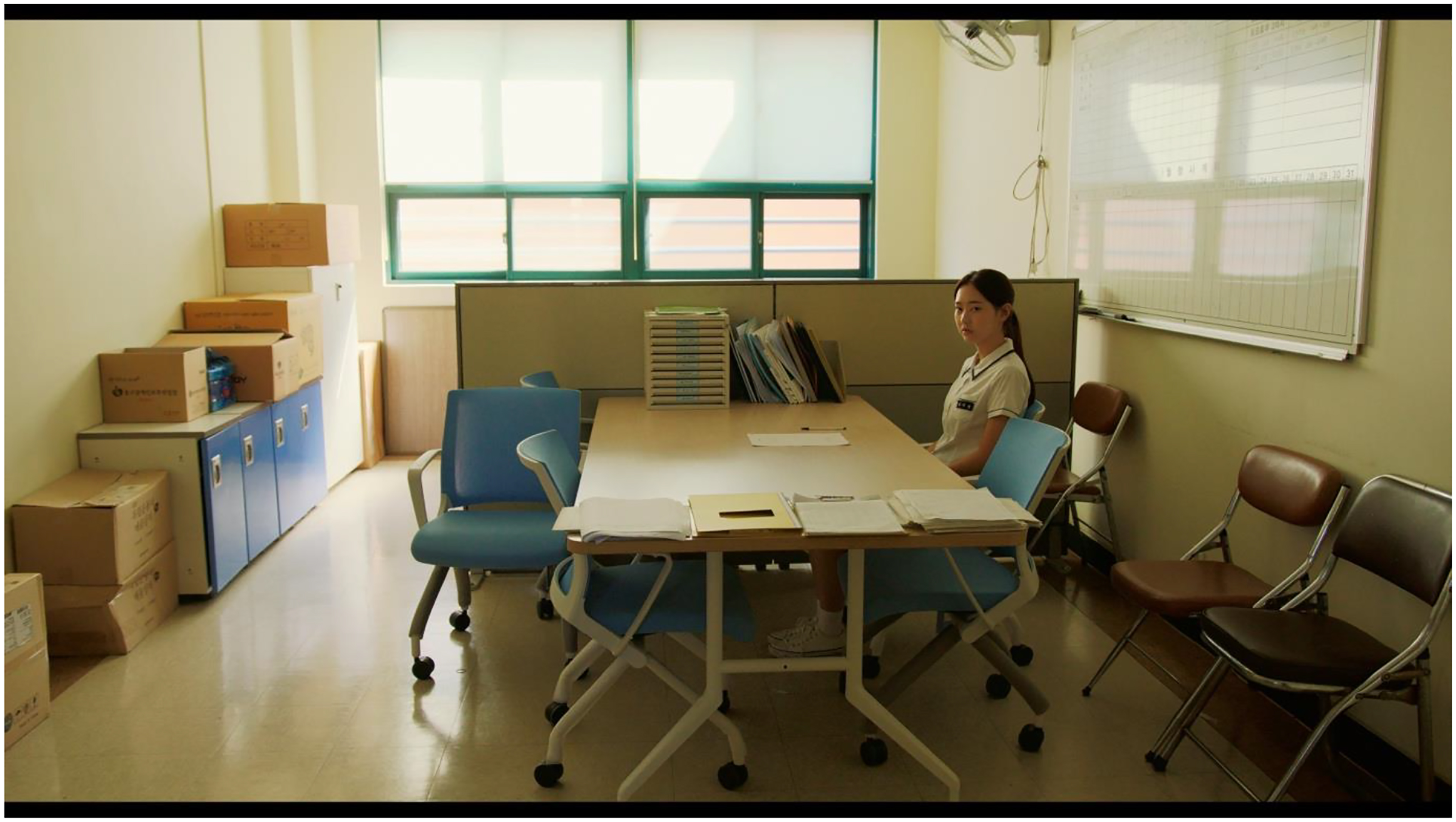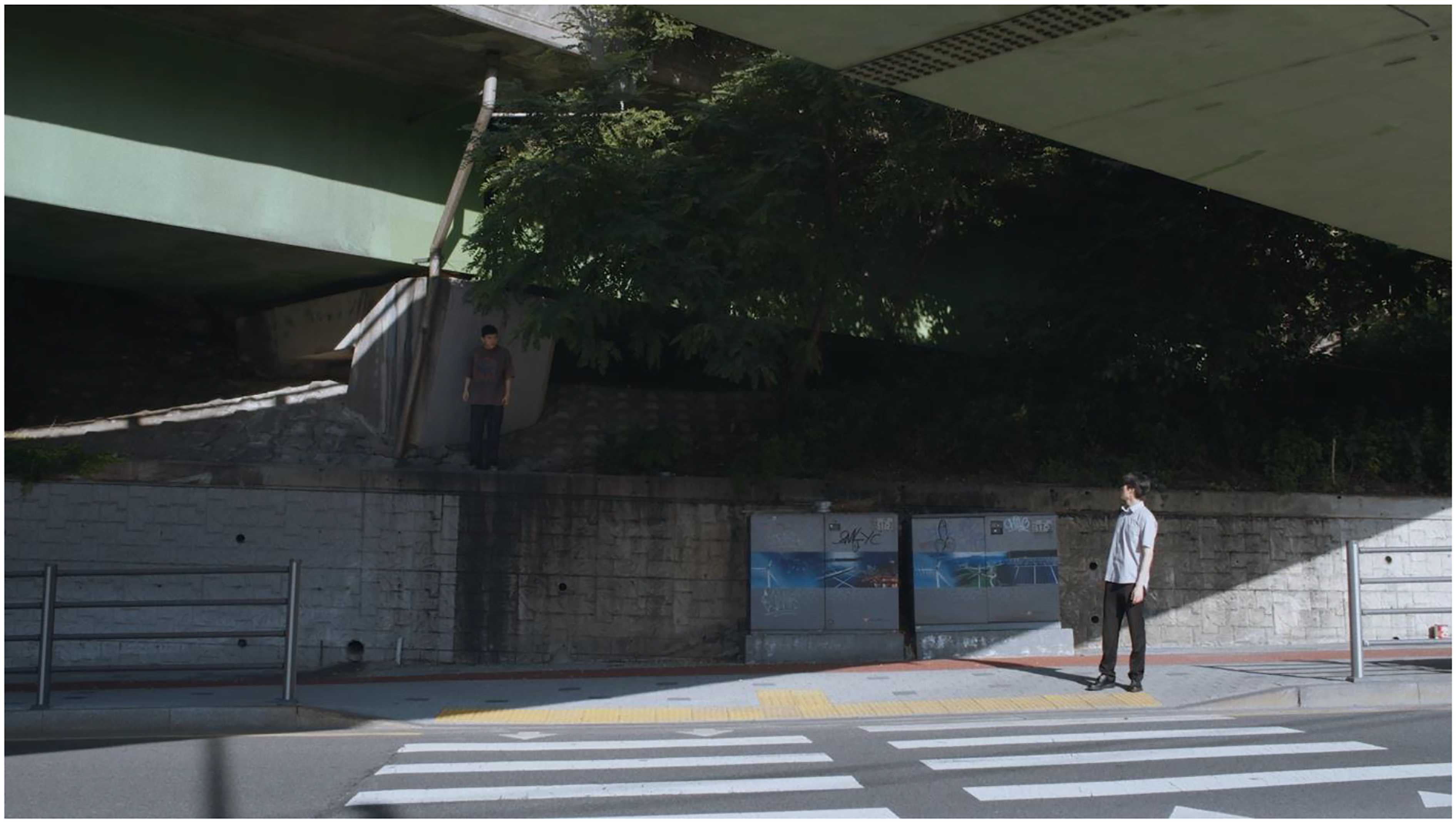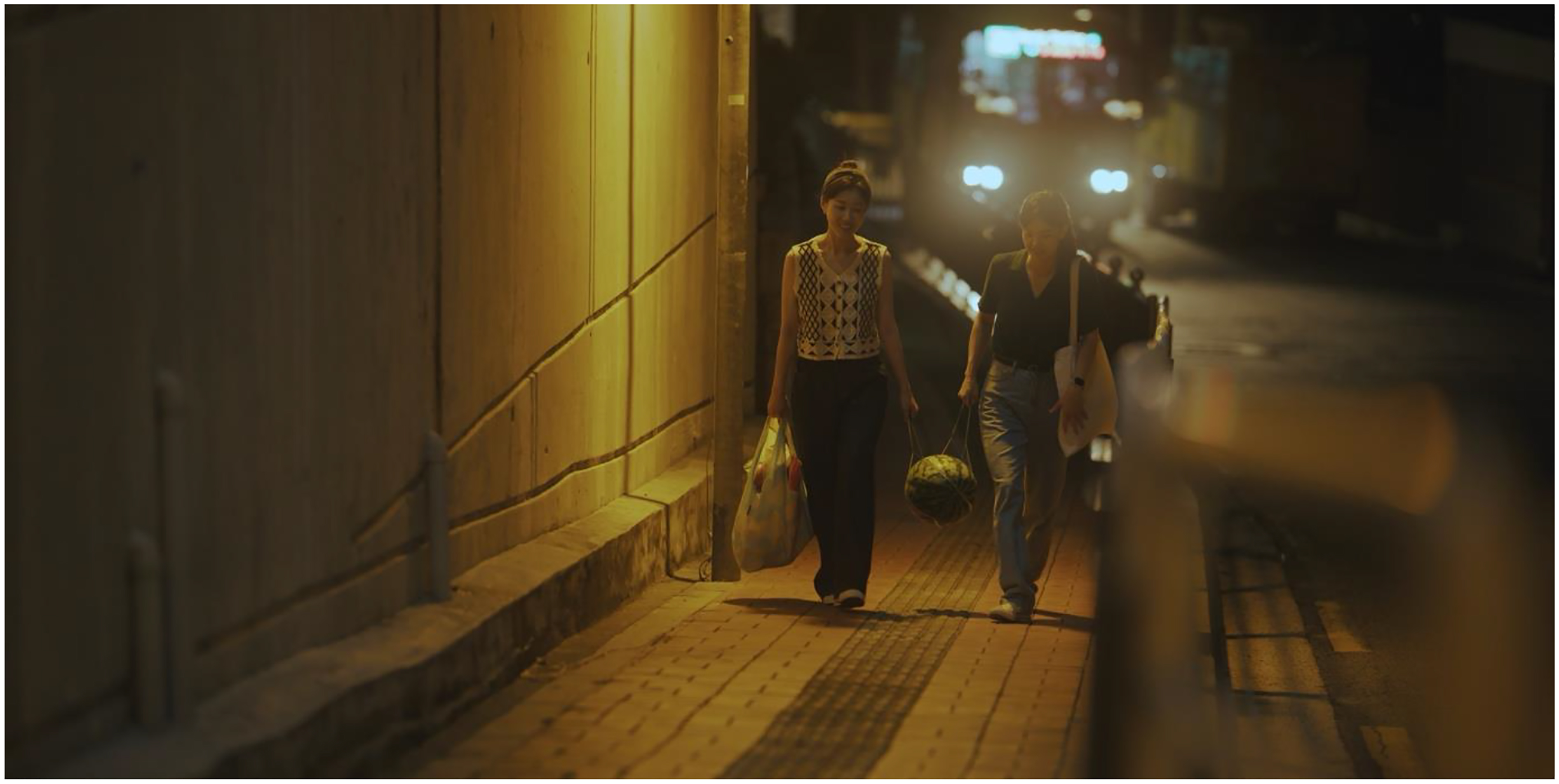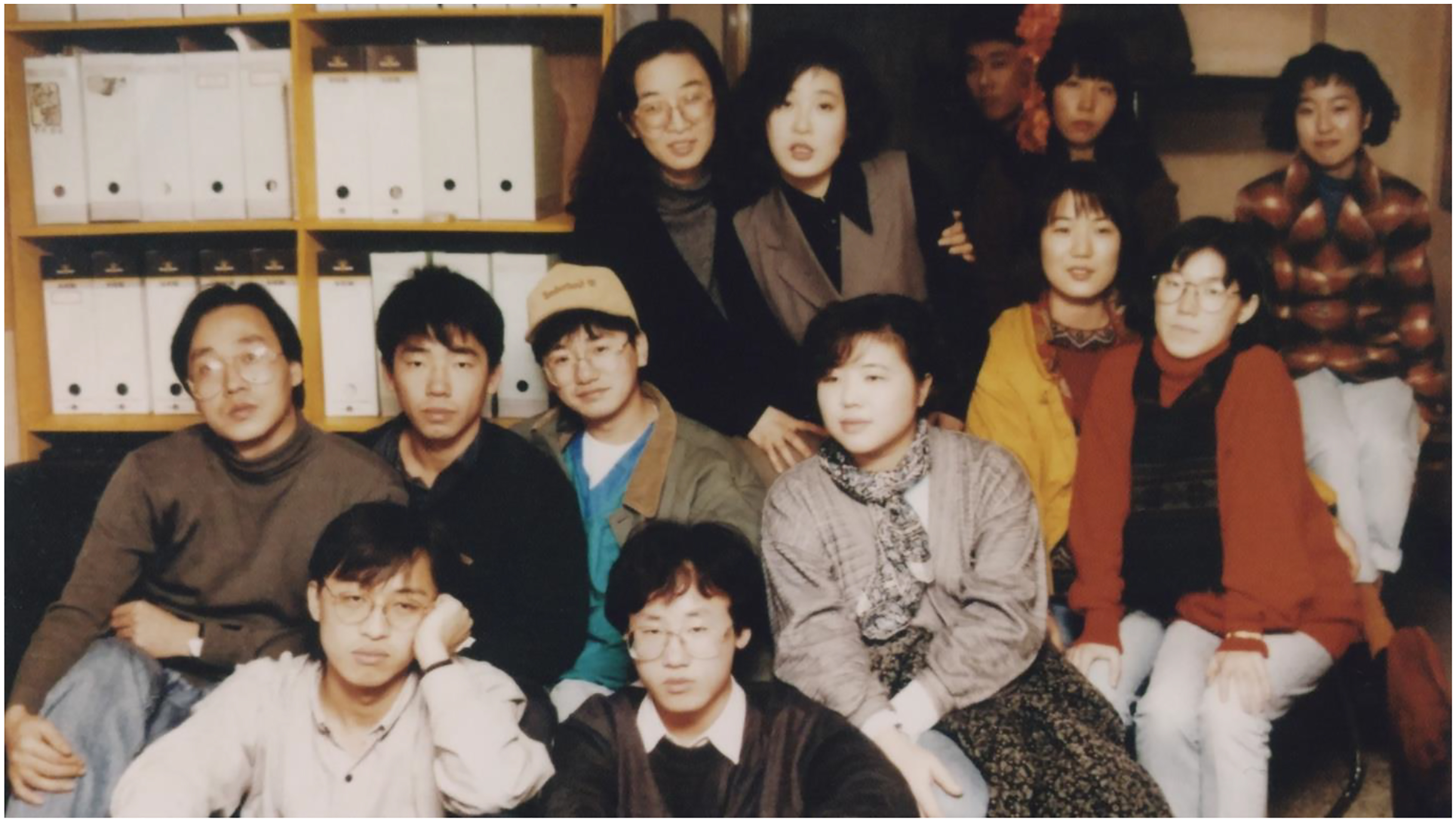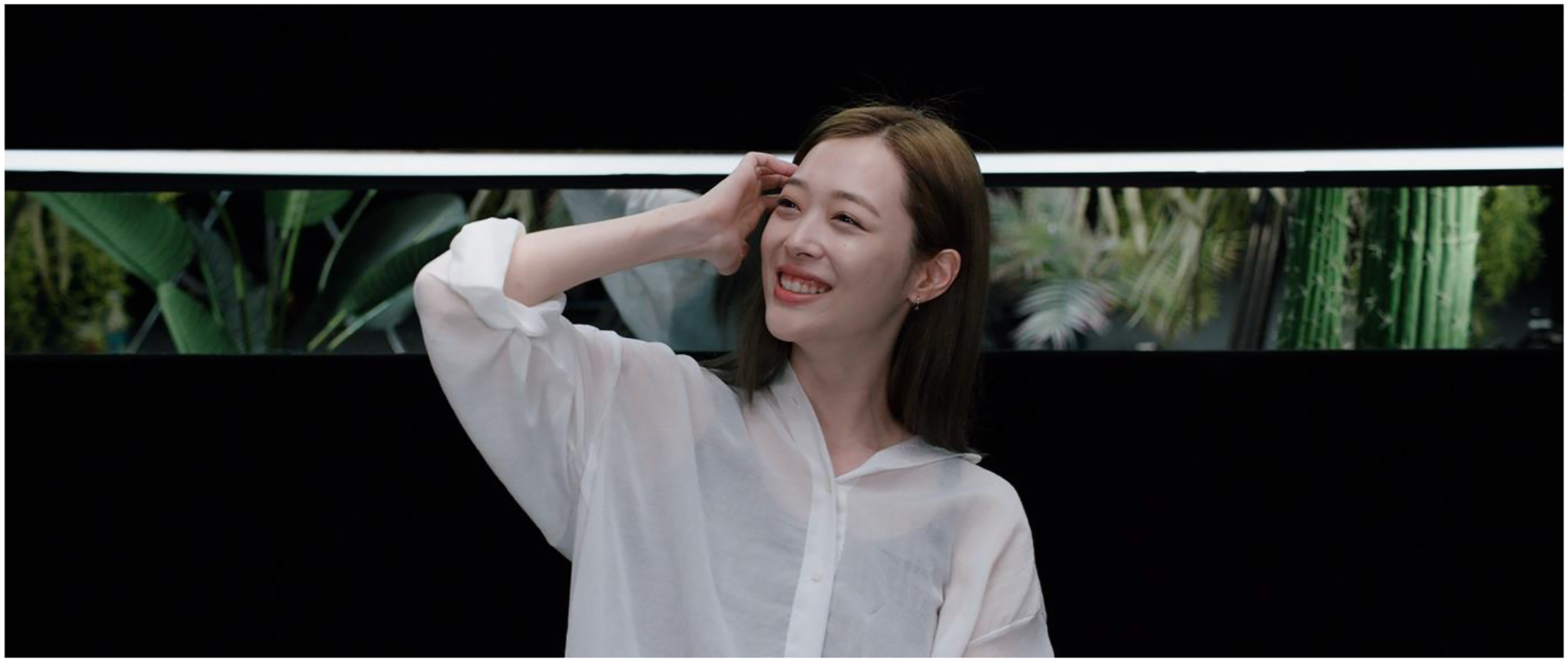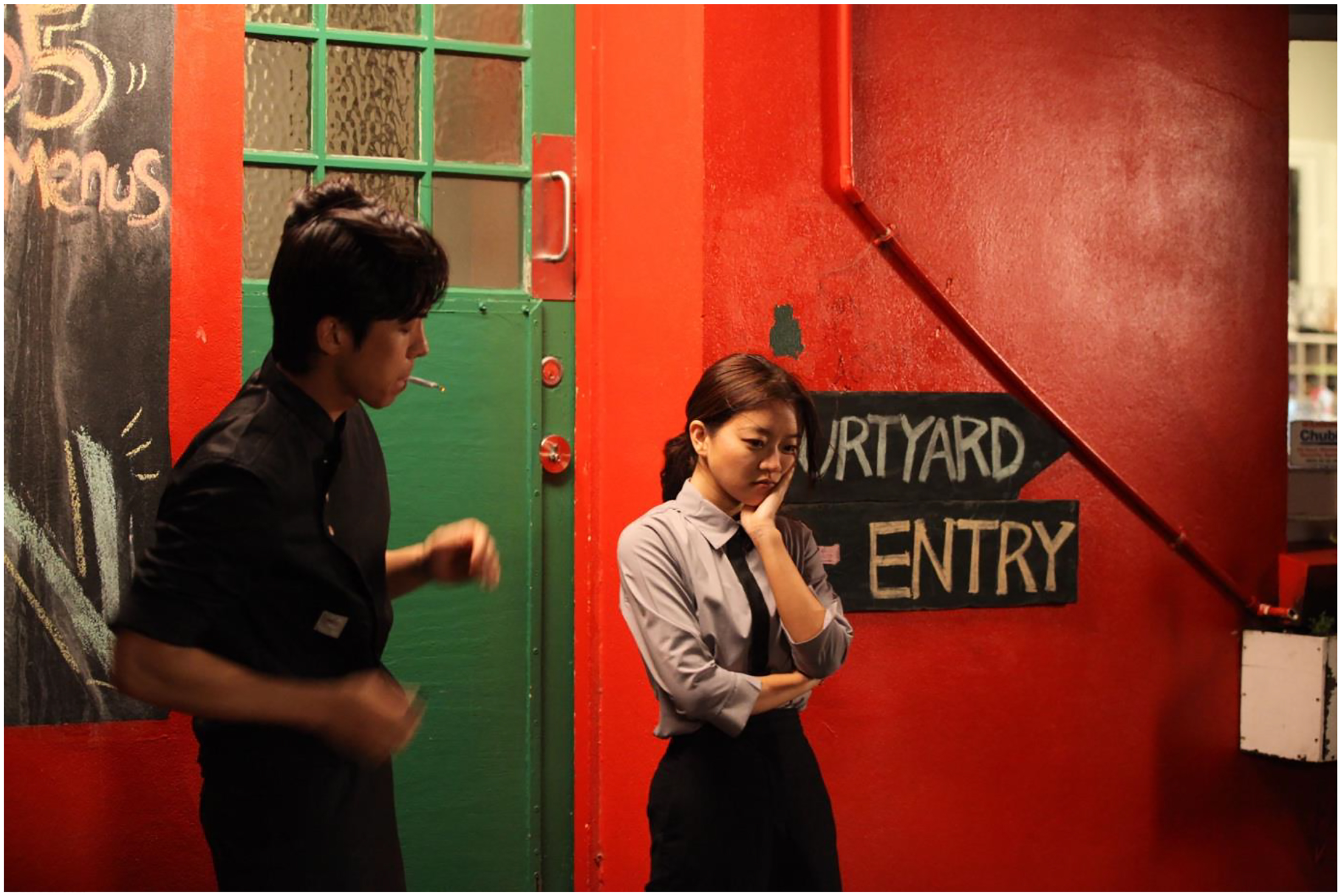The 2023 Busan International Film Festival, now in its 28th edition, had a rather chaotic lead-up over the past several months, with one of its founders, Lee Yong-kwan, stepping down amongst political pressure from the current conservative government, echoing a notorious incident from the previous right-wing administration in which the festival was almost cancelled following a controversial screening of an anti-government documentary, Diving Bell (The Truth Shall Not Sink with Sewol) (Lee Sang-ho and Ahn Hae-ryong, 2014). In addition, festival director Huh Moonyung was ousted following sexual harassment charges, the latest of many such resignations within South Korea following its #metoo movement, leaving the festival to lead programmer Nam Dong-chul and deputy director Kang Seung-ah. 1 All of this is reflective of the intensely political nature of South Korean festivals, especially Busan, which was formed in the late 1990s / early 2000s by left-wing dissidents who had battled hard throughout the 1980s and 1990s for the country’s democratization following years of authoritarian rule, all within a city that has been historically conservative. 2 This turmoil echoed that of the industry at large in the post-pandemic era, as arguably no national cinema was as strongly impacted as that of South Korea. In February 2020, the month before the global impact of COVID-19 began to be felt, Gi-saeng-chung (Parasite) (Bong Joon-ho, 2019) won the Academy Award for Best Picture, and the industry was coming off a year in which it had one of its highest market shares. Post-pandemic, audiences have not returned, even now, and especially, it seems, for domestic films, with many notable failures. 3 All of this has filtered into the local independent cinema, with even critically acclaimed work like Da-eum Sohee (Next Sohee) (July Jang, 2022) failing to find even a modest theatrical return. This has left the Korean features premiering at Busan in one of its weakest positions in over a decade.
Of course, the audience for South Korean content has not disappeared, as the huge success Korean drama series such as O-jing-eo Ge-im (Squid Game) (2021) showed; but this success has only seen increased streaming content, even post-pandemic (for example, the “Barbenheimer” phenomenon of this summer greatly underperformed here). 4 This year’s Busan lineup was reflective of this shift, with the five K-drama premieres (at a theatrical length of three episodes) gaining more local attention and interest than the Korean independent features. K-dramas, often premiering on local network television and characterized by their highly melodramatic style, have seen a large ascent, with the traditional series now being picked up by streaming platforms like Netflix, Apple, and Disney+, who are also developing their own versions and variations. In some ways, this is a return to the festival’s earlier years, where commercial films would often premiere here, and attention would be pulled away from the smaller works. In the 2010s, this situation changed, and independent films would be the main festival draws, parlaying this attention into modest box office success. 5 With the theatrical downturn, the festival is relying on the streaming content to drive interest, with these K-dramas primarily looking for the festival’s prestige (an exchange of cultural and economic capital, if you will) but also driving audiences away from the theatres. It is with all of this context that I will discuss this year’s Korean independent premieres, which as usual offer an incisive examination of the social environment often missing from the more mainstream fare. But this year’s entries also show some of the cracks in this system, with a deep pessimism at times about what future theatrical cinema await these works.
The most original and exciting, both thematically and aesthetically, of the Korean premieres was Sohn Hyun-lok’s debut Geu Yeo-reum-nal-ui Geo-jit-mal (That Summer’s Lie), which played in the “New Currents” program, the festival’s main competition section. 6 The story is within the “Coming of Age” drama, a favorite of both art cinema generally and Korean independents in particular, with such works as Woo-ri-deul (The World of Us) (Yoon Ga-eun, 2016), Beol-sae (House of Hummingbird) (Kim Bora, 2018) and last year’s Bi-mil-ui Eon-deok (The Hill of Secrets) (Lee Ji-eun, 2022) receiving critical recognition. However, the film subverts the expectations of this sub-genre, both in its structure and content, giving the viewer multiple partial versions of the story while even withholding others, not unlike this year’s Palme d’Or winner, Justine Triet’s Anatomie d’une Chute (Anatomy of a Fall), which also played here. Set in Busan, which is also the hometown of writer-director Sohn, the story begins with high school student Da-young writing a homework assignment about her summer vacation, causing her (male) teacher to become alarmed. He asks her to write out more details, after which we are shown, in flashback, the first version of her summer, involving her boyfriend, Byung-hoon, breaking up with her and then her seduction of her older, married math tutor in his home. This includes an excoriatingly uncomfortable 5-minute-long static take at a kitchen table as the two teenagers tell the man’s pregnant wife of the incident. When the story returns to the present, it is clear Da-young has not told the teacher the story we have just seen. He is unconvinced by her writing and demands her to write again. When the flashback continues, the high school couple are reunited but Da-young is now dealing with a pregnancy and the boyfriend unconvinced of his fatherhood due to her affair with her tutor. Again, it becomes clear that we are seeing as a viewer differs from the story she is writing to her teacher, whose interest in the story begins to feel uncomfortably voyeuristic, especially given the predatory behavior of the other older male authority figure in the film. By the conclusion, following yet another ambiguous flashback, no clear resolution has been reached, with the only development being that now both Da-young and Byung-hoon are in the teacher’s office writing their stories. Regardless, as a viewer, we are given a powerful glimpse into the world of the contemporary Korean teenager, even if some of that vision may be subjective projection. A great first work that will hopefully travel to other festivals and even, one can hope, get a respectable audience at home.
The other “New Currents” Korean title was Lee Jong-su’s Bu-mo Ba-bo (Heritage), not as successful in its execution as That Summer’s Lie but with an ambitiously complex structure that attempts to offer a variation on its indie cinema plot. Jin-hyun, who works at the local Social Welfare Center, develops a relationship with a younger co-worker, the troubled homeless teen Young-jin, who he allows to live with him, as well as an elderly lady, Sun-rye, who files repeated complaints with his office. As the story progresses, each character is given a section, marked by title cards, although the overall effect relies more on atmosphere and character development than any dramatic plot turns. There is also a reflexive element here, in which Jin-hyun discusses going to a local arthouse theatre but critiques many of the movies there as “peeking out of a small window from a safe space” and “overdoing the typical indie film shit.” The film we are watching may very well be subject to the same complaints, which is part of the joke, although I appreciated the flat style and use of long take two-shots of the two men in Jin-hyun’s apartment, which were the film’s most compelling moments. There is also a lack of resolution here, including a genuinely perplexing final shot, but it does not feel nearly as controlled and purposeful as the ambiguity in That Summer’s Lie. Nevertheless, an intriguing first work from a young filmmaker with talent.
Busan’s “Korean Cinema: Vision” section is often its most exciting, with first films from a more diverse group of directors than reflected within the bigger studio offerings. This year’s group was not amongst the strongest years in this category, especially for those looking for cinematic formal innovation, but it did feature two strong social dramas that intelligently examined its issues in a complex manner and from an unusual perspective. Lee Mi-rang’s Ddal-e Dae-ha-yeo (Concerning My Daughter) tells the story of a woman caught between two generations: she works at an elderly care facility, where she tries to keep a woman suffering from early-stage Alzheimer’s from being neglected, while also dealing with her lesbian daughter, who moves back home with her mother along with her long-time female partner. Director Lee, adapting the novel from Kim Hye-jin and making her first feature after over a decade in the industry, including working with noted auteur Lee Chang-dong, makes a smart decision to focus on the mother character, who is both admirable in her defense of the elderly while also unsympathetic in her lack of understanding towards her daughter and her sexuality, which she refuses to acknowledge. Lee allows us to identify with and critique this character, who is clearly drawn to her patient because of her own fear of death and loneliness while also claiming this is why she objects to her daughter’s life, which she feels will only lead to a lack of family. The irony is the character is in danger of becoming like the neglected elderly of Korean society because of her lack of understanding of the younger generation. The film never feels heavy-handed, even up to its quiet and thoughtful final shot, although that very restraint and intelligence may limit its ability to break through more widely. One of the festival’s acting prizes went to Oh Minae as the mother, richly deserved for her sympathetic portrayal of a woman that is not always easy to like.
Another fine social drama with an unusual take on the social problem film is Park Hong-jun’s Hae-ya Hal Il (Work to Do), in which the protagonist, Joon-hee, is an office worker hired to work in Human Resources for a large shipping company needing to make cuts to its workforce. It turns out he is very good at his job, manipulating the layoff criteria so that the most troublesome and management-unfriendly workers are cut while also writing Orwellian newsletters that perform their propaganda function perfectly. However, he begins to feel guilt over this role, a shame he is unable to express to those closest to him, especially his pregnant fiancé, with whom he grows more distant. There is a particularly effective scene with his mother, who appears only once but leaves a lasting impact as a former worker activist who has given up on social change. But despite this seeming didactic set-up, the story and characters are quite nuanced, with no clear heroes or villains. The system itself is producing the misery, and while director Park, who based the film on his own experiences, is pessimistic about the possibility of reversing this corruption, he also does not linger completely in despair, arguing that there is still moral value in protest and rebellion as well as within working in the system for change. The film is tellingly set in 2016, as the Park Geun-hye government, whose blacklisting of dissidents is part of the inspiration for the story, was in its final year, and ends with the lead character and his partner joining the protests that would lead to her dismissal. 7 Like Concerning My Daughter, Work to Do is straight-forward in its aesthetics and lacking in dramatic spectacle, but in many ways the type of story for which independent cinema exists. The film also received an acting prize for its lead, Jang Sung-bum, in an appropriately understated performance of a man forced to repress his turbulent emotional life.
The “Wide Angle” section, featuring documentaries and short films, included two of the more anticipated Korean premieres of the festival, both by acclaimed directors. Lee Hyuk-rae’s No-rae-mun: Se-gi-mal Shi-ne-pil Da-i-eo-ri (Yellow Door: ‘90s Lo-fi Film Club) chronicles the cinephilia movement in South Korea in the 1990s, with a focus on one group, called the Yellow Door, that included Bong Joon-ho amongst its members. Filmed during the pandemic, there is a reliance on Zoom interviews with Bong and the other members, but this is actually not a detriment, as the multiple images of the participants gives a sense of the collective, while the grainy screens echo the VHS era in which this cinephilia was cobbled together. Not surprisingly, as its most famous former member, Bong takes center stage, with an extended discussion of his first film, a short stop-motion animation titled Looking for Paradise which screened once at a club meeting but has been unseen since. There are many fascinating stories and details about the period, including the difficult process of attaining films (involving much illegal VHS copying), the translation of American film textbooks (often poorly), and even the group’s first journal, including sequence analysis of films such as The Godfather (Francis Ford Coppola, 1972) (a festival post-screening promotional giveaway included reproductions of the journal as well as the club’s video library). However, while the film is very enjoyable and an obvious pleasure for fellow film lovers, particularly Bong fanatics, it was disappointing that the politics of the period was given such little attention, mentioned briefly but quickly skipped over (notably, Bong seems uninterested and slightly embarrassed about this aspect). This is especially since director Lee’s previous film was so politically grounded: Mi-sing-ta-neun Yeo-ja-deul (Sewing Sisters) (2020) (co-directed with Kim Jung-young), which won the Grand Prize at the 2022 Wildflower Film Awards (Korea’s equivalent of the Independent Spirit Awards). A greater contextualizing of this group with the appropriate scholars would have added a needed depth to the at times unreflective nostalgia. 8 The film will be released at the end of October on Netflix, thus allowing it to reach a wide national and global audience, although there is an irony in that Netflix is a major player in the decline of the type of cinephilia being celebrated here, even a double irony in that Yellow Door celebrates a time when cinema, on VHS, was culturally dominant.
Less successful was Jinri-e-ge (Dear Jinri), the latest from Jung Yoonsuk, one of Korea’s most acclaimed documentarians, with such works as Non-fiction Diary (2014) and Bam-seom-hae-jeok-dan Seo-ul-bul-ba-da (Banseom Pirates Seoul Inferno) (2017), which also won the Wildflower’s Grand Prize back in 2018. The film will draw an audience because of its subject matter, the pop star and actress Choi Jinri, better known as Sulli, who tragically committed suicide in 2019. Shortly before her death, Jung had conducted an interview with her, around which Dear Jinri is structured. The problem is that the interview material is not especially compelling, and only has a kind of morbid interest because of her subsequent death. It seems as if Jung has no idea what he really wants to do with this material, and one suspects the original interview was meant to be somewhat critical, an approach that now would seem in poor taste. And while it is understandable why Jung does not want to make a conventional, expository biography, a viewer with no background in Sulli’s career will be truly lost. One wonders if Jung, as a middle-aged Korean man, is really the person to make a film about this individual, especially given the feminist interest in her as a figure, an aspect Jung really does not seem interested in exploring. 9
In fact, there were a few examples of veteran independent directors with below average films at this year’s festival, perhaps a coincidence but one that could not help but feel like a symbol of decline, despite the number of strong debuts from other filmmakers. The opening film this year was Jang Kun-jae’s Han-kuk-i Shi-reo-seo (Because I Hate Korea), the 11th Korean film to receive this honor and the 5th in last 8 years, a choice reflective of the director’s strong critical standing in independent circles, with such films as Jam Mot Deu-neun Bam (Sleepless Night) (2013) and Han-yeo-reun-mui Pan-ta-ji-a (A Midsummer’s Fantasia) (2015). As a fan of Jang’s work, this was one of my most anticipated movies of the festival, but unfortunately it is his weakest effort thus far. Although the story is very much in the independent film mode, with a young woman rejecting Korean society and workplace culture to explore life abroad, it is stylistically very conventional and dramatically uneven, seemingly an attempt by an independent sensibility at a more mainstream approach that ends up being unsuccessful at both.
At the opposite end of the spectrum is the fourth narrative feature from Ahn Sun-kyoung, I Yeong-hwa-ui Kkkeut-e-seo (At the End of the Film), a nearly three-hour long, self-reflexive art film about the difficulty of making an independent movie currently in Korea. Ahn’ second feature, Pascha (2015), was one of the best Korean films of the 2010s, but she had made only one film since, a common phenomenon among indie directors (Jang, despite his early critical success, went seven years between features). At the End of the Film is not amongst Ahn’s best works, with a 45-minute magical realism sequence that is a major weakness, but it is a telling document of the current moment, indicative of the real feeling of despair amongst this wider community. Not only is the director in the story having difficulty getting his movie made even after many years of pre-production, but he faces continued setbacks that are a microcosm of the broader issues of the indie industry: a producer is replaced after charges of sexual harassment; a web drama writer is brought in to make the script more commercial; and there is talk of turning the film into a streaming series. One character even declares: “people no longer care for our misery” and, in even more grandiose terms, “having lured you atop the cliff we call cinema, I am but a murderer.” While this is all quite heavy-handed and not entirely original, as cinema has been dying in one form or another since at least the 1950s, it is representative of a negative attitude that seems to be prevalent amongst indie veterans. But as this year’s festival has shown, younger filmmakers are continuing to pursue these kind of alternative social and political visions, perspectives that are still important to share and which only seem possible within the festival environment that Busan offers.
Acknowledgements
Funding for this research was provided by the Kwangwoon University Research Fund (2023).
Notes
- Patrick Frater, “Busan Film Festival Chairman Lee Yong-kwan Seeks Immediate Departure, Blames Political Interference,” Variety (June 28, 2023) https://variety.com/2023/film/news/busan-festival-chairman-lee-yong-kwan-quits-1235656573/ ⮭
- See SooJeong Ahn, The Pusan International Film Festival, South Korean Cinema and Globalization (Hong Kong: Hong Kong University Press, 2012), especially “Chapter 1: Why Pusan?: The Politcal Economy of a Film Festival,” 31–57. ⮭
- Jean Noh, “US Films Take Biggest Market Share at South Korean Box Office for the First Time in a Decade,” ScreenDaily (January 19, 2022) https://www.screendaily.com/news/us-films-take-biggest-market-share-at-south-korea-box-office-for-the-first-time-in-a-decade/5166647.article ⮭
- Oppenheimer (Christopher Nolan, 2023) is currently 10th at the Korean box office in 2023, with Barbie (Greta Gerwig, 2023) all the way down at 36 (1st in the U.S.). Korean numbers courtesy of the Korean Film Council: http://www.koreanfilm.or.kr/eng/news/boxOffice_Yearly.jsp?mode=BOXOFFICE_YEAR ⮭
- See Marc Raymond, “Beyond the Auteur: South Korea’s Domestic Independents as National Cinema,” Film Criticism 45 (1) (2021) https://doi.org/10.3998/fc.1024 ⮭
- The two winners of the New Currents competition were Iqbal Hossain Chowdhury’s Boli (The Wrestler) and Mori Tatsuya’s September 1923. A complete list of winners can be found at the BIFF website: https://www.biff.kr/eng/addon/10000001/page.asp?page_num=7223 ⮭
- For an analysis of this movement, see Paul Y. Chang, “Candlelight Protests in South Korea: The Legacies of Authoritarianism and Democratization,” Ehwa Journal of Social Sciences 34 (1) (2018): 5–18. ⮭
- This context is well covered by scholars such as Young-a Park, Unexpected Alliances: Independent Filmmakers, the State, and the Film Industry in Postauthoritarian South Korea (Stanford: Stanford University Press, 2015). ⮭
- For a discussion of Sulli that contextualizes her within South Korea’s feminist movement, see Hawon Jung, Flowers of Fire: The Inside Story of South Korea’s Feminist Movement and What It Means for Women’s Rights Worldwide (Dallas, TX: BenBella Books, 2023), 230–232. ⮭

